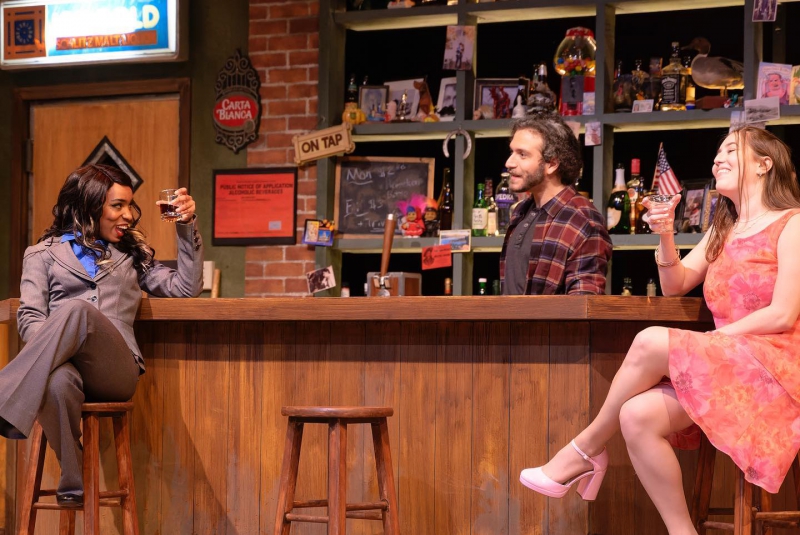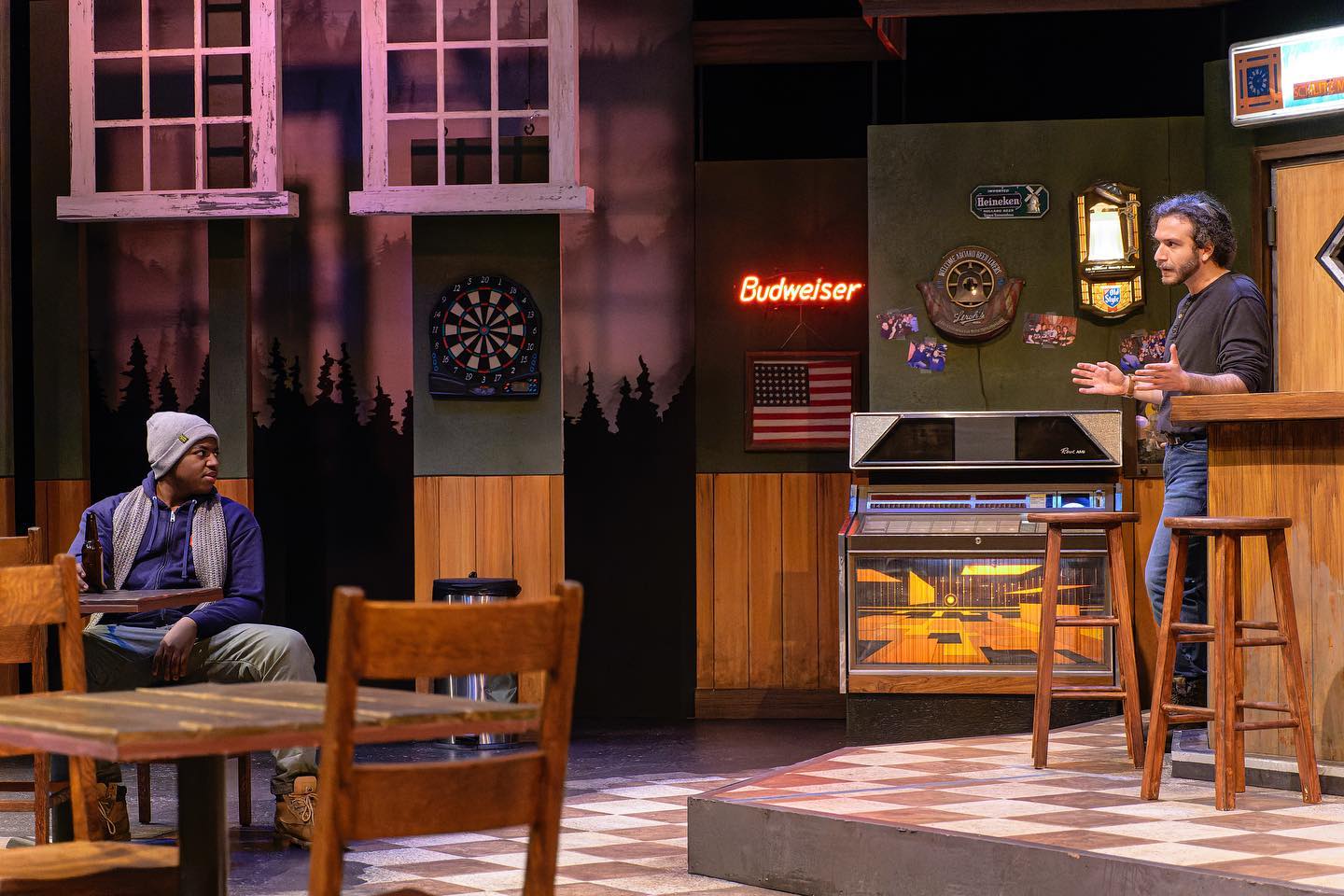You won’t leave Krannert Center’s Studio Theatre production of Sweat the same person you were when you came in. While I’ve been grateful for all of the live-streamed theatre during the pandemic, there’s nothing like live theatre. Being in the room with actors moving through three-dimensional space, fighting, loving, and enjoying life is a one-of-a-kind experience. Director Latrelle Bright has done it again in Champaign-Urbana. She’s delivered up a theatrical experience full of compassion, laughter, and loss. And this is the perfect time to produce Lynn Nottage’s 2017 Pulitzer Prize-winning Sweat. Earlier this year, Nottage simultaneously had a play and a musical running on Broadway (Clyde’s at the Hayes Theatre and MJ the Musical at the Neil Simon Theatre), as well as an opera based on her earlier play, Intimate Apparel, playing at the Lincoln Center Theatre. 2022 is the Year of Nottage and we’re fortunate that our Krannert Center for the Performing Arts invites us into the room with a playwright of such genius.
Gabriel Solis, head of the Department of Theatre at Illinois, opened the show with the solemn acknowledgement of the native tribal lands on which we sit, among them the Peoria, Kaskaskia, Piankashaw, Wea, Miami, Mascoutin, Odawa, Sauk, Mesquaki, Kickapoo, Potawatomi, Ojibwe, and Chickasaw Nations. His statement is crucial to the play and to UIUC’s role as a land grant institution. Nottage’s work and Latrelle Bright’s staging of the play concentrates on questions of place. Who belongs here? What does it mean to be “from” here? How does the trauma of slavery still infect everyday life? Where does immigration confront identity? As big as those questions sound, and they are, the play is set in the “neutral” space of Howard’s Pub in Reading, Pennsylvania during the early 2000’s as the Rust Belt was getting rustier. The play confronts racism, misogyny, class conflict, and the violence done to blue collar workers over the last half-century.
And yet. The play is warm, funny, and so character-driven, you’ll forget you’re not physically in this Pennsylvania pub. The first character you encounter in most plays is the set itself. And this one is transformative in its use of Krannert’s Studio Theatre space. Designed by Alyssa Thompson, with Tanner Funk at the helm with his creative and inviting lighting design, Dakota Erickson on sound, and John Boesche’s inspiring multimedia production, Howard’s Haus holds us in its grip as the play’s story unfolds. The small tube television behind the bar radiates with the recent history of the nation as the pub’s bartender, Stan, (David Stasevsky), serves as the physical centerpiece of Nottage’s story.
The story details the deterioration of a factory town where three best girlfriends, Cynthia (Haven Janeil Crawley), Tracey (Grania McKirdie), and Jessie (Maddy Flagg) engage with one ex-husband Brucie (Noah Smith), two sons, and the pub’s staff, Oscar (AJ Paramo). Cynthia’s son Chris (Jaylon Muchison) and Tracey’s son Jason (Jonathan Kaplan) are best friends who serve as third-generation workers at Olstead’s Steel Tubing plant.
I won’t bore you with a list of thesaurus-driven superlatives to spotlight any one role or actor because Bright’s production achieves something far more rare: ensemble status. The actors work in tandem. They listen to each other on stage and we experience the intense friendship between Muchison’s Chris and Kaplan’s Jason, the friction between aging girlfriends when their roles at the plant change, and the pain of loss in the stories we hear from Smith’s Brucie, Stasevsky’s Stan, and Paramo’s Oscar. Framed by Savaun Stokes’ Evan, the caring parole officer, Latrelle Bright has directed a working American ensemble, complete with grit, heart, and sweat. The play turns heartbreak into hope and I hope this cast will take a well-deserved second and third curtain call at the end of its run on Saturday, April 23rd.
I had a chance to sit down with director Latrelle Bright a few days before opening night at my beloved Espresso across from KCPA (shout out Espresso–I’ve loved you since I landed here in 1989, before you got all fancy and added that second floor and extra space, which was well before any of the actors in Sweat were born). I asked her what she wanted audiences to walk away with and why this play, now, in this (post?)-pandemic moment.
Bright noted, “I hope audiences will see themselves in these characters. But that’s also part of the challenge because we have to be honest with ourselves. How do these characters’ stories shape the way we see our own work and what’s the responsibility we have to each other? I explore the dynamics of entitlement–what does it mean to feel entitled to a job? To this land? To a narrative? The play addresses inequity head-on. We, as an audience, have to do the work.”
Bright continued: “This play addresses friendships and co-workers. How have they addressed inequity in their relationships? When I, as a Black woman, have a relationship with a white friend and we have not had a conversation about race, haven’t addressed it, then we see the macro problems on the micro scale. And of course, this play is about place: who belongs here? What does it mean to be ‘from’ here?”

Photo from the Illinois Theatre Facebook page.
Bright’s whole production, from scenic design to ensemble to the final tableau, merges us with the lives of these very real and well-researched characters. As dramaturg Meghan Landon notes, “Nottage began her journey with Sweat in 2011 after watching friends struggle to make ends meet due to the stock market crash of 2008….When asked what viewers should take away from the play, Nottage responded that she wanted her audience to see the characters as three-dimentional. [The play] entreats the audience to see Sweat as a practice in empathy.” What a beautiful way to spend our time in this moment in our town, practicing empathy.
One of the most precious resources we have in Champaign-Urbana and the surrounding area includes the soul-enriching work of artists committed to live theatre. From original plays and works through the U of I’s Pennydreadful Players, to Krannert ‘s many stages and offerings, across town at Parkland College’s theatres, to Urbana’s Station Theatre, and the timeless classics offered across all of our venues, including the Champaign Urbana Theatre Company, the Twin City Theatre Company, and of course, our summer isn’t complete without a night on the lawn and at ‘the Globe’ with the Illinois Shakespeare Festival. We have wonderful live theatre in our midst–don’t miss out.
Lynn Nottage’s work, without question, places her in the pantheon of great American playwrights including August Wilson, Paula Vogel, and Arthur Miller. Take this opportunity to experience everything live theatre delivers. Reserve tickets now to catch the second and final week of this transformational play.
Sweat
April 19th-22nd, 7:30 p.m.
April 23rd, 2:00 p.m.
Krannert Center for the Performing Arts
Studio Theatre
500 S Goodwin
Urbana
Tickets: Advocate $50 / Standard $25 / SC $24 / Non-UI Student $15 / UI Student & Youth $10








